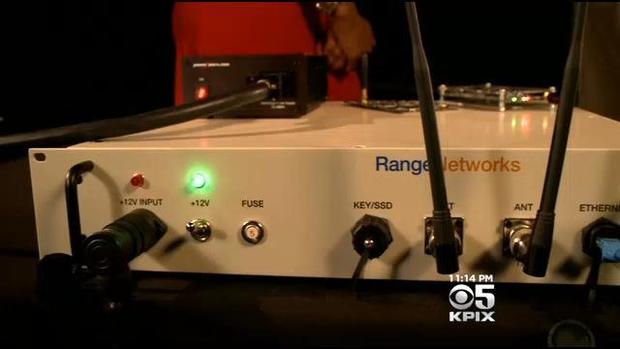More Bay Area Police Departments Interested In Getting 'Stingray' Cellphone Surveillance Device
SAN FRANCISCO (KPIX 5) -- It's called a Stingray: A cellphone surveillance device so top secret, law enforcement agencies don't even like to admit they have it. But KPIX 5 has confirmed Oakland, San Francisco and San Jose police are using Stingrays to track suspects.
Now, Fremont Police and the Alameda County District Attorney's office are applying for federal grants to get a new version of Stingray, called Hailstorm. The use of the devices is increasing, potentially at the expense of your privacy.
You may think you are private when you're talking on your cell phone, think again. From an undercover car or even strapped to a detective's chest walking down the street, police are using a device called a Stingray to gather the serial numbers of surrounding phones.
They're chasing a target, but sweeping up your identity, activity and location as well.
"Any communication that you initiate, a voice call, an SMS or an internet communication, I can monitor that using this device," said Andrew Becherer, a security expert with ISEC partners.
Becherer showed KPIX 5 similar commercial devices available to consumers. They work just like a mini cell phone tower, hijacking potentially hundreds of phones within their radius.
"You come in close proximity to me, I can fool your device into believing that I am your wireless carrier. And your phone will connect to my device," Becherer said.
The devices are legal. But Becherer said criminals could potentially exploit them.
How are police using them? Documents KPIX 5 obtained from law enforcement agencies are heavily redacted. In one stack of hundreds of documents obtained from the San Jose Police Department, the word Stingray doesn't even come up. It's just referred to as "surveillance technology equipment."
Oakland police didn't send KPIX 5 any documents at all, saying they are exempt from disclosure for security reasons.
"The local police have been trying really hard to keep the public and policymakers and even judges completely in the dark," said Nicole Ozer, technology and civil liberties Policy Director for the ACLU of Northern California. "They refuse to tell us they even have Stingrays, citing non-disclosure agreements that they have signed with the manufacturer, which seems completely ridiculous."
Ozer said law enforcement is using the devices without a warrant, making the practice hard to track, and violating state privacy laws.
"The fact that hundreds or thousands or millions of people's private information is being swept up in this dragnet surveillance is a really serious problem," she said.
A problem that privacy advocates predict could soon get more challenging.
The Alameda County's DA's office along with Oakland and Fremont police applied this year for a $500,000 federal grant to upgrade Stingray to something called Hailstorm, which could be even more powerful, and equally secretive.
Local law enforcement agencies turned down requests for interviews.
The Alameda County DA's office sent KPIX 5 the following statement: "The electronic surveillance technology we are seeking to acquire is an important tool to use for the safety and protection of the public. This technology can be used to prevent or respond to a terrorist attack. It can be used to track and apprehend serious and violent criminals and fugitives from justice. It can help to locate and recover missing persons and kidnapping victims. It may also be used in search and rescue operations to help locate missing or trapped victims of a natural disaster or terrorist attack. The use of this technology would speed the ability of rescue workers to locate injured victims quickly and to speed up the administration of life-saving medical intervention. The technology allows Law Enforcement and Public Safety Officers to use up-to-date technology to promote public safety and law enforcement well into the future. It is important to remember that this technology would not be used without court authorization."
San Jose police also sent KPIX 5 a statement, saying "disclosure of technical information regarding the technology would enable law violators to escape detection."




